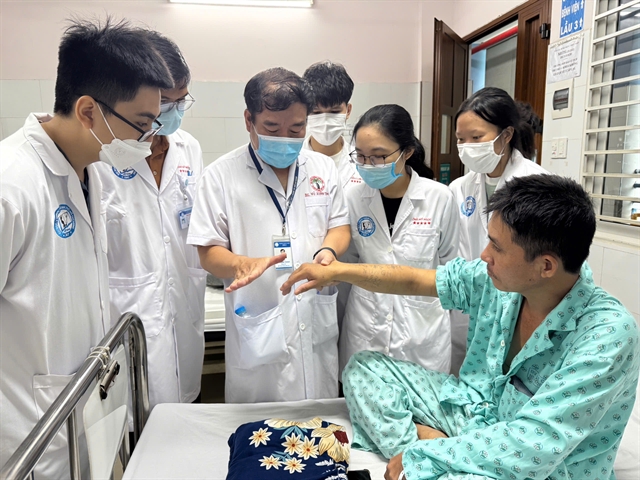 Society
Society

 |
| A baby is treated at the Paediatrics Department of the Central Hospital for Tropical Diseases. — VNA/VNS Photo |
HÀ NỘI — The National Hospital for Tropical Diseases reported that the Paediatrics Department had admitted a one-month-old boy from Hà Nội who was approximately on the fifteenth to twentieth day of whooping cough (pertussis).
Upon admission, the child exhibited characteristic symptoms of prolonged coughing episodes lasting six to seven hours each, phlegm, red face, cyanotic lips, and poor appetite.
After these coughing episodes, the child produced long, sticky phlegm resembling chewing gum.
Following examination by doctors, the child was diagnosed with severe pneumonia in conjunction with pertussis.
Medical history revealed that when the child first showed signs of coughing, the family immediately took him for a check-up. When the test results confirmed pertussis, he was admitted for treatment.
However, after ten days, despite the treatment, the child continued to have severe coughing fits. The family then brought him to the National Hospital for Tropical Diseases for continued treatment.
Currently, the child is fever-free, and the coughing fits have decreased.
Dr. Nguyễn Thành Lê, deputy head of the Paediatrics Department, said that since the beginning of the year, the department has reported scattered cases of whooping cough.
Whooping cough often starts subtly with symptoms resembling nasal inflammation, such as nasal congestion, runny nose, mild sore throat, a mild dry cough, and sometimes low fever or no fever, lasting for about one to two weeks.
“This stage is easily confused with symptoms of mild respiratory infections, especially in young children, as the cough is minimal and can be mistaken for bronchiolitis. The child mentioned above is a typical case,” said Dr Lê.
After the initial phase, the cough becomes more severe, with prolonged episodes lasting ten to twenty hours or thirty seconds to a minute of continuous coughing without a breath, causing respiratory distress due to lack of oxygen.
The severe coughing fits end with a "whooping" sound upon inhalation and may be accompanied by vomiting. Although children are often exhausted after these severe fits, they appear relatively healthy between episodes.
Dr Lê emphasised that the frequency and severity of these severe coughing fits increase as the disease progresses, lasting from two to six weeks, and are more frequent at night.
The disease may be milder and lack the characteristic whooping cough in vaccinated children, adolescents, and adults.
Typically, the disease lasts about three months from the initial stage to full recovery. Pertussis can resolve on its own and is commonly seen in children under two months old.
To protect themselves and their families, especially young children, the doctor advised the public to ensure full vaccination and seek medical attention promptly when symptoms appear.
If detected and treated early, pertussis has a better prognosis. However, delayed detection can lead to severe complications.
Common complications that severely impact health include pneumonia-bronchitis, respiratory failure, encephalopathy due to hypoxia during respiratory distress, and other complications such as conjunctival haemorrhage, pneumothorax, hernia strangulation, rectal prolapse, otitis media, seizures, intellectual disability, paralysis, umbilical and rectal hernia.
Therefore, early and proper detection and treatment of pertussis are crucial, he added. — VNS




